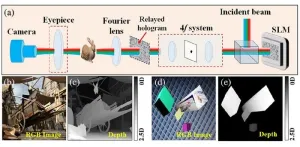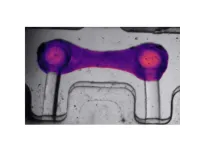(Press-News.org) A new study by Upstate Medical University researchers shows that recreational cannabis use may offer protection against cognitive decline.
The study, done by Master of Public Health (MPH) student Zhi Chen and Professor Roger Wong, Ph.D., MPH, MSW, analyzed a large data set from the CDC and found that compared to non-users, non-medical cannabis use, such as for recreational purposes, was significantly associated with 96 percent decreased odds of subjective cognitive decline (SCD). Medical and dual (medical and non-medical) use were also associated with decreased odds of SCD, although not significant. Cannabis consumption frequency and method were also not significantly associated with SCD.
SCD is an important outcome of interest as prior research shows individuals with SCD have a 2 times higher risk for dementia, which currently has no cure or definitive prevention approaches.
Wong said that previous studies have found negative associations between cannabis use and cognitive decline, so the results were surprising, though he is quick to point out the study had several limitations and that these results are just a snapshot of one year.
“The main takeaway is that cannabis might be protective for our cognition, but it is really crucial to have longitudinal studies because this is just a snapshot of 2021,” said Wong, assistant professor Department of Public Health & Preventive Medicine. “We do not know if non-medical cannabis leads to better cognition or the other way around if those with better cognition are more likely to use non-medical cannabis. We need longitudinal studies to see long term if non-medical cannabis use is protecting our cognition over time. That’s something we don’t know yet, but that research is hindered since cannabis remains illegal federally.”
Data for this study was obtained from 4,744 U.S. adults aged 45 and older in the 2021 Behavioral Risk Factor Surveillance System (BRFSS). SCD was a self-reported increase in confusion or memory loss in the past year. Odds of SCD by cannabis use reason, frequency, and method were examined after imputing missing data, applying sampling weights, and adjusting for sociodemographic, health, and substance use factors.
The study differs from previous research in that it focuses on middle-aged and older adults, and it uniquely considers the three facets of cannabis use: type of use (medical or non-medical), frequency of use, and mode of use (smoking, vaping, eating or dabbing).
“The reason I think this study is so great is we looked at all the different dimensions of cannabis use,” he said. “The fact that we included all three is a huge contribution to the research because I do not believe such a study has been done before.”
Wong said he was surprised that mode and frequency had no bearing on SCD since other studies involving younger participants found a negative connection between brain health and cannabis use, indicating perhaps that the age of the participants plays a role in the different results.
The study, which was published in Current Alzheimer Research was Chen’s final project in the Advanced Biostatistics course in the MPH program taught by Wong.
“I applied the knowledge and analytical skills learned from the courses in the Public Health Methods concentration to this study,” Chen said. “Dr. Wong guided me through the process, from formulating a research question to preparing a full manuscript. I feel fortunate to have incredible professors in our program who train us to become well-rounded public health professionals with the skills for epidemiology and biostatistics work.”
The authors did note some limitations with the study, including the inability to consider state-by-state cannabis regulations; thus, potential selection bias could arise if the population of certain states is either over or underrepresented due to varying measures of cannabis use.
Strengths of the study include using a national data set, which increases the generalizability of the findings. Wong said the difference in protection between medical and non-medical use comes down to the compounds that make up cannabis. Medical-grade cannabis has higher concentrations of CBD whereas non-medical has higher concentrations of THC.
Non-medical users often use cannabis to improve sleep and reduce stress. Poor sleep and chronic stress increase the risk for dementia so the protection in SCD could come from better sleep and stress relief that cannabis provides. Medical cannabis is used primarily for pain relief.
“Based on our findings, we don’t see the CBD in medical cannabis being beneficial for cognitive health,” Wong said.
Read the Full-Text article from here: https://benthamscience.com/article/138726
END
Does cannabis use affect cognitive decline?
The article by Master of Public Health (MPH) student Zhi Chen and Professor Roger Wong, PhD, MPH, MSW, is published in the journal, Current Alzheimer Research, 2024
2024-04-08
ELSE PRESS RELEASES FROM THIS DATE:
Heart disease, depression linked by inflammation: study
2024-04-08
Coronary artery disease and major depression may be genetically linked via inflammatory pathways to an increased risk for cardiomyopathy, a degenerative heart muscle disease, researchers at Vanderbilt University Medical Center and Massachusetts General Hospital have found.
Their report, published April 5 in the journal Nature Mental Health, suggests that drugs prescribed for coronary artery disease and depression, when used in combination, potentially may reduce inflammation and prevent the development of cardiomyopathy.
“This work suggests that chronic low-level inflammation may be a significant contributor to both depression ...
Illinois study identifies atmospheric and economic drivers of global air pollution
2024-04-08
URBANA, Ill. – Carbon monoxide emissions from industrial production have serious consequences for human health and are a strong indicator of overall air pollution levels. Many countries aim to reduce their emissions, but they cannot control air flows originating in other regions. A new study from the University of Illinois Urbana-Champaign looks at global flows of air pollution and how they relate to economic activity in the global supply chain.
“Our study is unique in combining atmospheric transport of air pollution with supply chain analysis as it tells us where the pollution is coming ...
Advancing real-time 3D holographic display: A breakthrough in computer-generated holography
2024-04-08
Holographic displays offer a promising avenue for achieving lifelike 3D reproductions with continuous depth sensation, holding potential applications in fields such as entertainment, medical imaging, and virtual reality. However, the conventional methods for generating computer-generated holograms (CGHs) rely on repetitive computations, leading to increased computational complexity and impracticality for real-time applications.
To tackle this issue, researchers from the University of Shanghai for Science and Technology (China) have introduced a novel method for CGH generation that significantly reduces computational overhead while ...
New study shows renewable energy could work as power source at the Amundsen-Scott South Pole Station
2024-04-08
A recent analysis shows that renewable energy could be a viable alternative to diesel fuel for science at the South Pole. The analysis deeply explores the feasibility of replacing part of the energy production at the South Pole with renewable sources.
For almost as long as humans have spent time in Antarctica, the continent has been a home for science. One of the research outposts located there is the Amundsen-Scott South Pole Station. The science done there includes studies of climate change and cosmology.
Currently, ...
Cathie Biga is new American College of Cardiology president
2024-04-08
Cathie Biga, MSN, FACC, today became president of the American College of Cardiology and made history as the organization’s first non-physician president. She will serve a one-year term representing over 56,000 cardiovascular care team members around the world and leading the cardiovascular organization in its mission to transform cardiovascular care and improve heart health for all.
“I’m excited to bring my own set of leadership skills and perspectives to the ACC as we kick off the first year of our new Strategic Plan and celebrate the College’s 75th ...
Data shows medical marijuana use decreased in states where recreational use became legal
2024-04-08
Embargoed for release until 5:00 p.m. ET on Monday 8 April 2024
Annals of Internal Medicine Tip Sheet
@Annalsofim
Below please find summaries of new articles that will be published in the next issue of Annals of Internal Medicine. The summaries are not intended to substitute for the full articles as a source of information. This information is under strict embargo and by taking it into possession, media representatives are committing to the terms of the embargo not only on their own behalf, ...
Houston-area energy startup incubator wins phase 1 of DOE competition
2024-04-08
The U.S. Department of Energy’s Office of Technology Transitions (OTT) selected Texas Innovates, a non-profit organization focused on hydrogen and carbon innovation and expansion in the greater Houston and Gulf Coast region, as one of 23 phase 1 winners of the Energy Program for Innovation Clusters (EPIC) Round 3 competition. Notably, Texas Innovates is the only Texas entity to advance to phase 2 of the competition.
“We have been working towards this day since we identified the need for energy hardware incubation in 2017 and were a finalist in 2019 for C40 Cities global competition to make Houston’s Velasco Incinerator ...
A pulse of innovation: AI at the service of heart research
2024-04-08
A Pulse of Innovation: AI at the Service of Heart Research
Columbia biomedical engineers use AI to build a transformative new tool to study and diagnose heart function
Understanding heart function and disease, as well as testing new drugs for heart conditions, has long been a complex and time-consuming task. A promising way to study disease and test new drugs is to use cellular and engineered tissue models in a dish, but existing methods to study heart cell contraction and calcium handling require a good deal of manual work, are prone to errors, and need expensive specialized equipment. There clearly is a critical medical ...
Targeting vulnerability in B-cell development leads to novel drug combination for leukemia
2024-04-08
Despite having an overall survival rate of 94%, B-cell acute lymphoblastic leukemia (B-ALL), the most common childhood cancer, can prove challenging to treat, with survival among relapsed or resistant cases falling between 30-50%. Recent work by St. Jude Children’s Research Hospital scientists discovered which tumor cells resist treatment and why. This enabled the rational design of a combination therapy that better controlled high-risk subtypes of B-ALL in mouse models. The findings were published today in Cancer Cell.
“We found a new explanation of B-ALL ...
People make more patient decisions when shown the benefits first
2024-04-08
Key takeways
UCLA psychologists asked experiment participants to choose to receive $40 in seven days or $60 in 30 days, for example, under a variety of time constraints.
The experiment showed that people tend to make more impulsive decisions if they think about time delays first, and more patient decisions if they think about the greater reward associated with waiting longer.
The findings could be applied where people are being encouraged to make life choices that will benefit them in the long run, such as eating healthier, exercising or saving for retirement, by emphasizing the future large rewards and deemphasizing ...
LAST 30 PRESS RELEASES:
Novel camel antimicrobial peptides show promise against drug-resistant bacteria
Scientists discover why we know when to stop scratching an itch
A hidden reason inner ear cells die – and what it means for preventing hearing loss
Researchers discover how tuberculosis bacteria use a “stealth” mechanism to evade the immune system
New microscopy technique lets scientists see cells in unprecedented detail and color
Sometimes less is more: Scientists rethink how to pack medicine into tiny delivery capsules
Scientists build low-cost microscope to study living cells in zero gravity
The Biophysical Journal names Denis V. Titov the 2025 Paper of the Year-Early Career Investigator awardee
Scientists show how your body senses cold—and why menthol feels cool
Scientists deliver new molecule for getting DNA into cells
Study reveals insights about brain regions linked to OCD, informing potential treatments
Does ocean saltiness influence El Niño?
2026 Young Investigators: ONR celebrates new talent tackling warfighter challenges
Genetics help explain who gets the ‘telltale tingle’ from music, art and literature
Many Americans misunderstand medical aid in dying laws
Researchers publish landmark infectious disease study in ‘Science’
New NSF award supports innovative role-playing game approach to strengthening research security in academia
Kumar named to ACMA Emerging Leaders Program for 2026
AI language models could transform aquatic environmental risk assessment
New isotope tools reveal hidden pathways reshaping the global nitrogen cycle
Study reveals how antibiotic structure controls removal from water using biochar
Why chronic pain lasts longer in women: Immune cells offer clues
Toxic exposure creates epigenetic disease risk over 20 generations
More time spent on social media linked to steroid use intentions among boys and men
New study suggests a “kick it while it’s down” approach to cancer treatment could improve cure rates
Milken Institute, Ann Theodore Foundation launch new grant to support clinical trial for potential sarcoidosis treatment
New strategies boost effectiveness of CAR-NK therapy against cancer
Study: Adolescent cannabis use linked to doubling risk of psychotic and bipolar disorders
Invisible harms: drug-related deaths spike after hurricanes and tropical storms
Adolescent cannabis use and risk of psychotic, bipolar, depressive, and anxiety disorders
[Press-News.org] Does cannabis use affect cognitive decline?The article by Master of Public Health (MPH) student Zhi Chen and Professor Roger Wong, PhD, MPH, MSW, is published in the journal, Current Alzheimer Research, 2024






